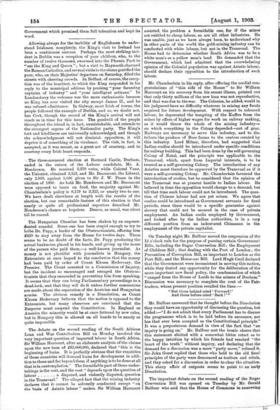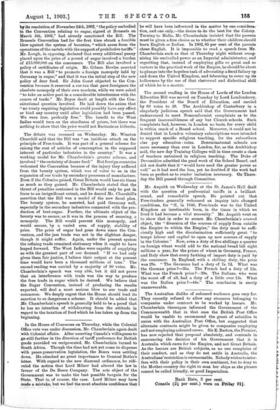The important debate on the second reading of the Sugar
Convention Bill was opened on Tuesday by Mr. Gerald Balfour who said that the House of Commons in approving
by its resolution of November 24th, 1902, "the policy embodied in the Convention relating to sugar, signed at Brussels on March 5th, 1902," had already sanctioned the Bill. The Brussels Convention had for the first time struck a forcible blow against the system of bounties, "which arose from the operations of the cartels with the support of prohibitive tariffs." Mr. Lough, in opposing, declared that every additional penny placed :upon the price of a pound of sugar involved a burden of £15,000,000 on the consumers. The Bill also involved a policy of certificates of origin. Mn Gibson Bowles asserted that it was a Bill "to promote a foreign monopoly held by Germany in sugar," and that it was the initial step of the new policy of dear food. Sir John Gorst objected to the Con- vention because it reserved a sur-tax that gave foreigners the absolute monopoly of their own markets, while we were asked "to take an active part in a considerable interference with the course of trade." Mr. Bryce dealt at length with the Con- stitutional question involved. He laid down the axiom that "no treaty requiring legislation could possibly have any effect or bind any country until after legislation had been passed. We were free, perfectly free." The benefit to the West Indies would turn on the steadiness of prices, but there was nothing to show that the price would not fluctuate as hitherto.







































 Previous page
Previous page